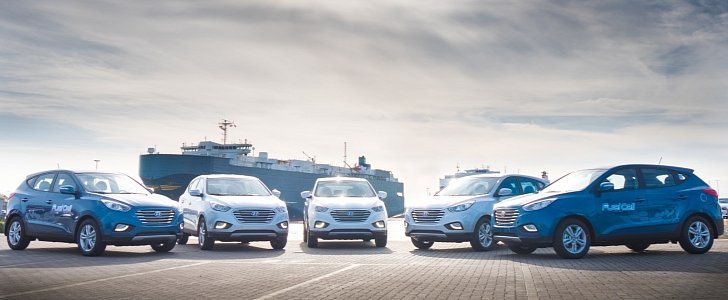If the battery-powered electric vehicles market is still growing up, the hydrogen fuel cell one hasn’t yet learned how to walk. Yet more and more manufacturers are coming up with new vehicles or conversions of existing ones that use liquid hydrogen as fuel.
The latest such example is Hyundai, the Korean company with an extraordinary ascension over the last few years that has just announced plans for a new luxury brand called Genesis. At the same time, they were extremely busy during last month delivering 50 more ix35 Fuel Cell cars to the European market.
This half a century of non-polluting cars come to fill the ranks next to the other over 200 already in use there, with the Korean hydrogen-powered EVs selling in no less than 13 European countries now.
The 50 new EVs will later find their way towards a series of private and corporate customers who have chosen this alternative power option over the long list of alternatives.
The ix35 Fuel Cell is the first hydrogen-powered car to be mass-produced and offered for sale in Europe. The existing fleet of ix35 Fuel Cell vehicles has already covered over 1.2 million kilometers (750,000 miles).
The idea of a car whose only emission is clean water sounds excellent, but there are still a few drawbacks, and they all have to do with the liquid hydrogen the fuel cell needs to operate. For one thing, the liquid hydrogen infrastructure is growing, but refueling these cars will still be a problem for the next few years. Then, there’s the whole debate of the liquid hydrogen manufacturing process, which is very high energy-demanding and also not so clean. Finally, the hydrogen needs to be highly pressurized in order to remain in liquid form, so fuel tanks are a huge potential hazard if punctured.
Nevertheless, there are several carmakers pushing the technology across Europe, and Hyundai is one of them. In fact, Hyundai has plans to become a leading environmentally-friendly carmaker by 2020, and it has joined multiple initiatives aiming to spread the use of fuel cell vehicles by making the necessary resources more available to the actual owners of the cars.
The ix35 Fuel Cell has a 136 hp electric motor that can push the compact SUV to a top speed of 160 km/h (100 mph). A full tank of liquid hydrogen is enough for a maximum range of 600 km (373 miles), which is considerably more than what the best current battery-powered EV can offer.
While 50 vehicles in one month for a whole continent may not sound like much, it’s Hyundai’s determination that’s worth acknowledging, as well as the company’s future plans. We should expect much more in terms of alternative power from Hyundai in the few years left until 2020, then.
This half a century of non-polluting cars come to fill the ranks next to the other over 200 already in use there, with the Korean hydrogen-powered EVs selling in no less than 13 European countries now.
The 50 new EVs will later find their way towards a series of private and corporate customers who have chosen this alternative power option over the long list of alternatives.
The ix35 Fuel Cell is the first hydrogen-powered car to be mass-produced and offered for sale in Europe. The existing fleet of ix35 Fuel Cell vehicles has already covered over 1.2 million kilometers (750,000 miles).
The idea of a car whose only emission is clean water sounds excellent, but there are still a few drawbacks, and they all have to do with the liquid hydrogen the fuel cell needs to operate. For one thing, the liquid hydrogen infrastructure is growing, but refueling these cars will still be a problem for the next few years. Then, there’s the whole debate of the liquid hydrogen manufacturing process, which is very high energy-demanding and also not so clean. Finally, the hydrogen needs to be highly pressurized in order to remain in liquid form, so fuel tanks are a huge potential hazard if punctured.
Nevertheless, there are several carmakers pushing the technology across Europe, and Hyundai is one of them. In fact, Hyundai has plans to become a leading environmentally-friendly carmaker by 2020, and it has joined multiple initiatives aiming to spread the use of fuel cell vehicles by making the necessary resources more available to the actual owners of the cars.
The ix35 Fuel Cell has a 136 hp electric motor that can push the compact SUV to a top speed of 160 km/h (100 mph). A full tank of liquid hydrogen is enough for a maximum range of 600 km (373 miles), which is considerably more than what the best current battery-powered EV can offer.
While 50 vehicles in one month for a whole continent may not sound like much, it’s Hyundai’s determination that’s worth acknowledging, as well as the company’s future plans. We should expect much more in terms of alternative power from Hyundai in the few years left until 2020, then.

